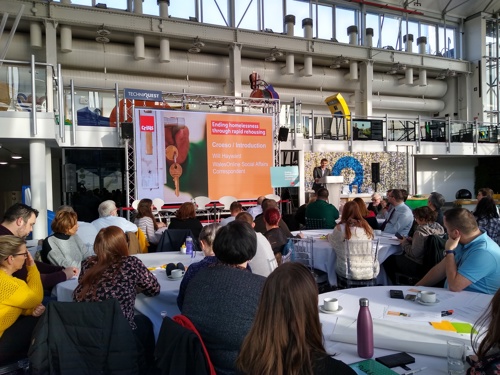Ending homelessness in Wales through rapid rehousing

20.02.2020

Recently Crisis hosted the first in a new policy seminar series bringing people together to develop the solutions needed to end homelessness in Wales. At the event we asked what role a ‘rapid rehousing’ approach can play in ending homelessness, drawing on the research and implementation at home and abroad.
We all want to live in a society that ensures every person has their basic need for a home and support met. But for a growing number of people across Wales, that’s far from the reality and we know many thousands of households across Wales are homeless. This includes people sleeping rough but also those living in emergency accommodation without a plan to move on; on the sofas of friends or family; or living in dangerous accommodation (‘beds in sheds’).
But homelessness isn’t inevitable and can be ended. Ending homelessness doesn’t mean that no-one will ever lose their home again. In most cases we can prevent it from happening in the first place, and in all cases homelessness can be ended as quickly as possible.
What does ‘rapid rehousing’ mean?
When people experience homelessness, moving into temporary accommodation is often the default response. Sometimes people end up staying for long periods of time and the numbers of households in this situation has reached a record high since 2015. Long stays in temporary accommodation can damage people’s wellbeing and the financial costs in running and maintaining these services are significant.
A rapid rehousing approach prioritises access to settled, affordable housing as soon as possible with tailored support provided according to the individual’s needs. In a rapid rehousing system, accommodation is not conditional on accessing certain services, support or – as one of our members put it – “showing you’ve done your time.” Many people will be familiar with Housing First, which is one model of rapid rehousing that is proven to work for people with complex needs for support. But the principles of the rapid rehousing approach can apply to everyone in different ways.
Of course it is always better, whenever possible, to prevent homelessness before people experience it. Along with a broader preventative system, rapid rehousing can make sure any experiences of homelessness are really short.
How do we get there?
A change to a rapid rehousing approach depends on making sure funding, cultures and systems all support people away from homelessness and into housing quickly with all the support they need.
The Homelessness Action Group, chaired by the chief executive of Crisis, Jon Sparkes, will report to the Welsh Government Housing and Local Government Minister, Julie James AM, on how we put the delivery of rapid and permanent rehousing at the heart of preventing, tackling and ending homelessness in Wales. The discussions at the Crisis seminar will be reported directly to members of the Action Group to help with this work. Crisis colleagues in Scotland have also written an overview of rapid rehousing transition plans there, including practice examples and ideas to share.
Based on the feedback from our seminar and what we know works, seminar attendees concluded that:
- Legal changes are needed to make it work – abolishing priority need, intentionality and local connection, situating rapid rehousing in a broader preventative and universal approach to ending homelessness.
- Significantly increasing housing supply to deliver the homes people need, in particular social housing; and improving security of tenure in the private rental sector and access to social rented accommodation for people who’ve experienced homelessness.
- Restoring Local Housing Allowance Rates so they cover the cost of rents to ensure the private rented sector can be an effective part of the solution.
After significant change in 2014 in how Wales approaches homelessness, rapid rehousing can build on these changes and further develop the support that people can access. It will require improved, flexible working across public services and a period of transition, where parts of the current system and parts of the rapid rehousing system are run in parallel until rapid rehousing has been scaled up.
There are no shortcuts but with the right policies and approaches in place, we know that we can end homelessness together.
For media enquiries:
E: media@crisis.org.uk
T: 020 7426 3880
For general enquiries:
E: enquiries@crisis.org.uk
T: 0300 636 1967
